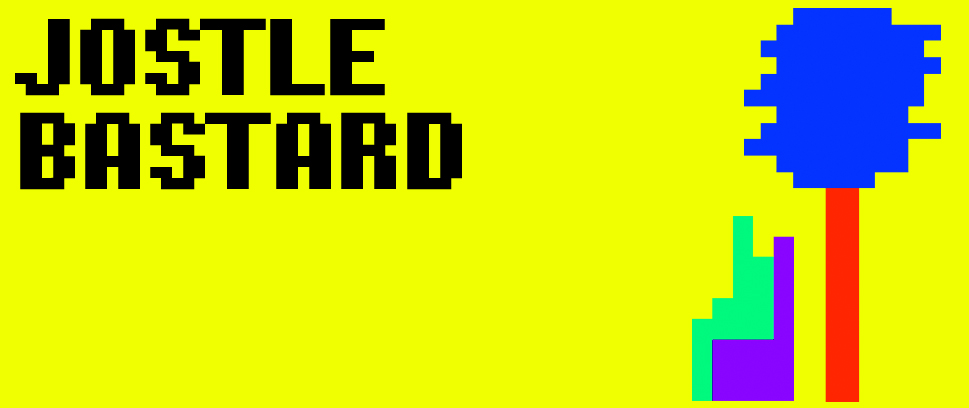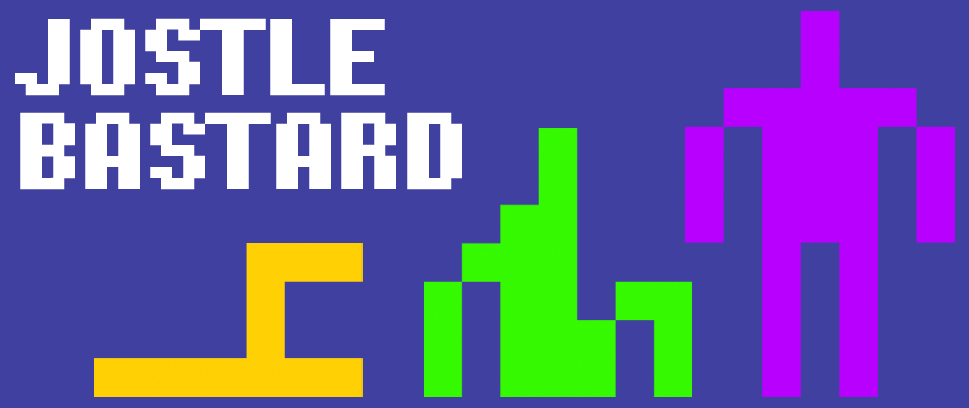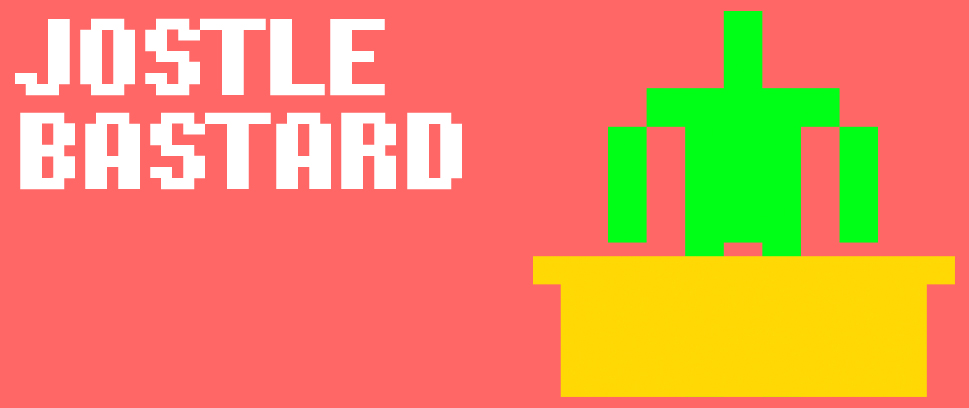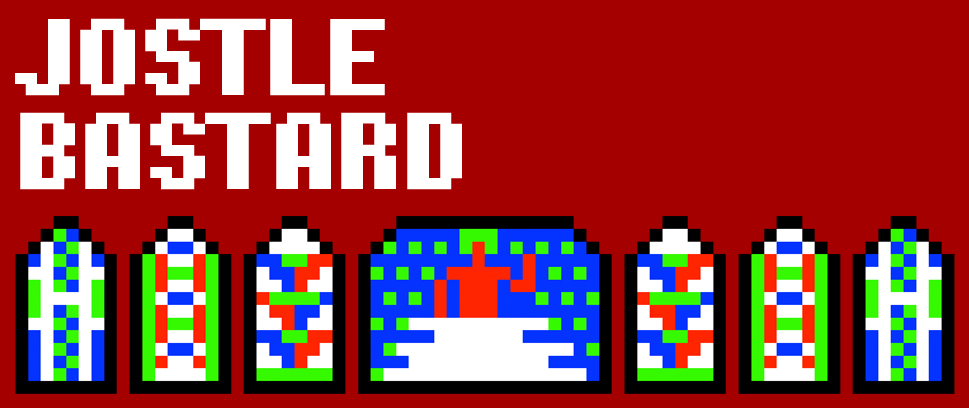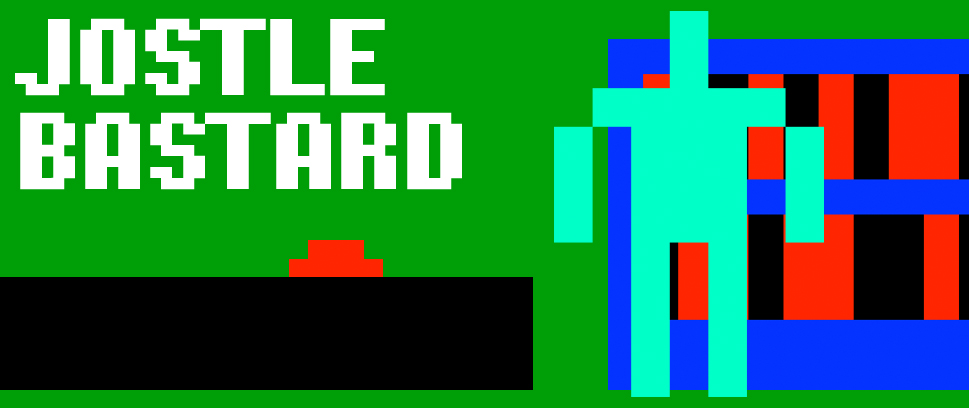
The Jostle Letters
Hi Pippin,
Congratulations on Jostle Bastard! I am keen to see what folks think of it, not only because it is great fun, but also because you’ve given us such a deep look into its development by sharing your notebook, diary entries and so many production builds of the game. The only thing that is missing is something you and I have frequently discussed over the course of the year: the role of satire in Jostle Bastard.
 I think this is particularly interesting because I don’t see much satire in videogames. Or, at least, not good satire. Grand Theft Auto V stirred this particular pot up a few months ago, but it largely falls flat. I think it is safe to say that there is an intent to satirize in GTAV. There is no way that a game can be so full of Archie Bunkers without being at least dimly self-aware. On the other hand, the game’s barbs are so chortlingly immature. What does substituting BAWSAQ for NASDAQ tell me about the world? Zilch. In the end, GTAV is a massive game that strains so hard to be so many things that it winds up being nothing at all, least of all satire.
I think this is particularly interesting because I don’t see much satire in videogames. Or, at least, not good satire. Grand Theft Auto V stirred this particular pot up a few months ago, but it largely falls flat. I think it is safe to say that there is an intent to satirize in GTAV. There is no way that a game can be so full of Archie Bunkers without being at least dimly self-aware. On the other hand, the game’s barbs are so chortlingly immature. What does substituting BAWSAQ for NASDAQ tell me about the world? Zilch. In the end, GTAV is a massive game that strains so hard to be so many things that it winds up being nothing at all, least of all satire.
With Jostle Bastard, you are aiming at Hotline Miami, a game that seems to have avoided the pitfalls that claimed the likes of Huckleberry Finn and “Money for Nothing” to be deemed a successful satire by critics, in this case of ultra-violence in videogames. Except, that doesn’t ring true to me either. Hotline Miami is violent, undoubtedly, but not once during my playthrough did I think to myself, “Oh, the horror!” In fact, Hotline‘s genius is how efficiently it teaches you to kill within the parameters of the game. Perhaps I am jaded, but it always struck me as a celebration of (ultimately harmless) videogame violence, rather than an indictment. We can choose to deconstruct our relationship with the game’s violence after the fact, but while we are playing, we revel in the carnage.
[pullquote]What does substituting BAWSAQ for NASDAQ tell me about the world? Zilch.[/pullquote]
I think Jostle Bastard succeeds as a satire because it is satirical on a mechanical level. It is a game about the repercussions of being a dickhead, but you, the player, have to choose to be that dickhead. In Hotline, there is no game at all if you don’t start murdering people, but in Jostle Bastard, you can live a normal, polite life. The problem is, that normal, polite life is incredibly boring. It is impossible to not want to trash your apartment after a while, or aggravate those stiffs in the coffee show. That’s the point of some videogames, right, to create safe spaces for transgressive behavior?
In fact, that is just the tip of the iceberg – Jostle Bastard makes me think about all sorts of questions. But I am more curious what your take is. I know you were a bit uncomfortable with the role of satire in the game early on. What changed? And come to think of it, do you see Jostle Bastard as your first foray into satire? I rather think a lot of your games fit that bill.
We also have to discuss AmishQuest, jostling kids and my failed efforts at turning you into a real life Jostle Bastard, but maybe I am getting ahead of myself…
———
Hey Stu,
Yeah, it’s pretty great the game is finally (hopefully) ready to be out there, given that it’s a project that’s been on my mind in some form for, well, more than a year now, which is unusual for my traditional “think of, immediately make” cycle.
It started out as a response to Joel Goodwin from Electron Dance, who referred to my game Ludwig Von Beatdown as something along the lines of “bastard jostle.” The two words were catchy for me somehow, and so there was a bit posturing where I said I was going to make that game and so on. At some point it flipped to “jostle bastard” and the name just stuck with me.
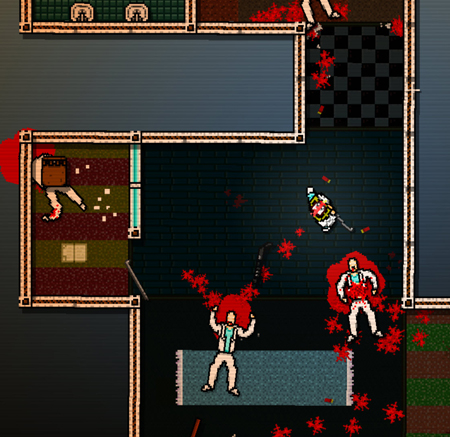 At the very beginning, the game’s concept was literally just the titillation of being irritating as a game mechanic, bumping into people. (Something you can do in the GTA games, for instance, though it feels more menacing to me in those cases.) But I was also judging for the first time for the IGF last year and so I ended up playing Hotline Miami for that. I was in a particularly analytical/critical mood when I played it. I’d read what felt to me like an awful lot of praise for the game’s treatment of violence and how it did make you think about “the horror, the horror.”
At the very beginning, the game’s concept was literally just the titillation of being irritating as a game mechanic, bumping into people. (Something you can do in the GTA games, for instance, though it feels more menacing to me in those cases.) But I was also judging for the first time for the IGF last year and so I ended up playing Hotline Miami for that. I was in a particularly analytical/critical mood when I played it. I’d read what felt to me like an awful lot of praise for the game’s treatment of violence and how it did make you think about “the horror, the horror.”
My first response was basically just disappointment when I played Hotline Miami and found what felt, to me, like almost no commentary or engagement with violence at all. It’s a really fun and exciting game about slaughtering rooms full of people, I enjoyed it (though of course the action palls after a while). And then it has that postmodern twist at the end, which just incensed me for some reason. I don’t normally get worked up about the games I played, but at the time, particularly because Hotline Miami was so “indie” and had been made by Cactus, whose games I admire…it just infuriated me somehow.
So Jostle Bastard, an innocent game about being annoying, took shape in my mind much more as a game about Hotline Miami. And that was a problem for me, because I really didn’t want to embrace that aspect of it for quite a long time. It really held the project in a bad kind of tension for me for months because I didn’t want to be all negative about someone else’s game and say I thought it had flaws. Partly that’s the extreme positivity of the indie world, I think, and partly, well, I wasn’t comfortable with something that felt like it would be a public statement.
[pullquote]I’m going to make a game about Hotline Miami and that’s an okay thing do.[/pullquote]
But for as long as I shied away from Jostle Bastard being about Hotline Miami, I couldn’t make it, was totally stuck and was full of many flavours of guilt, as some of our correspondence (and my diary) reflect. I was guilty about wanting to make a critical/satirical game, guilty about not making it, guilty about the guilt, and so on.
When I eventually did embrace it and said “I’m going to make a game about Hotline Miami and that’s an okay thing do,” I felt so much better. In the end I managed to remind myself that my approach has always been to just try stuff and see what happens, rather than agonize over doing the best thing. It was liberating to return to that and just figure I’d make this thing and maybe it’d work as a critique and as satire, and maybe not.
I guess Jostle Bastard isn’t my first attempt at satire, really, most of my early games were kind of satire of various game traditions, but they tended not to be specifically about a real person’s work. Hot Coffee was about a specific game (and its surrounding controversy), but it didn’t exactly seem like it would matter much to poke gently at Rockstar. I guess they felt somehow low risk. So I think that while Jostle Bastard isn’t necessarily my first satirical game, maybe it is the first time I’ve really gone out of my way to make something satirical with a point of view that I genuinely cared about getting across. And that felt/feels risky to me.
And now of course the floodgates have opened and I’m thinking, “AmishQuest…that seems like a good idea…”
———
Hey Pippin,
I don’t think Cactus is going to turn up at your house in an animal mask. Jostle Bastard definitely falls within the realm of light hearted Horatian satire. In fact, the more I think about it, the more I wonder if, while Hotline Miami provides the framework for the satire, Jostle Bastard might really be skewering the critical community that was so keen on having Hotline be a scathing example of Juvenalian satire.
 It is interesting that no one that I know of accused Drive, the Nicolas Winding Refn movie that inspired so much of Hotline Miami, of being a satire. The critical need for Hotline Miami to be satirical seems rather insecure to me. Sure, it is violent, but is it about violence? How come it isn’t about altered states of perception? The subversion of sensory information that occurs throughout the game seems a more interesting vein to mine rather than the buckets of blood. As an industry, we’re apparently still a little tender over all that bunk about those tired allegations about violent games causing violent behavior.
It is interesting that no one that I know of accused Drive, the Nicolas Winding Refn movie that inspired so much of Hotline Miami, of being a satire. The critical need for Hotline Miami to be satirical seems rather insecure to me. Sure, it is violent, but is it about violence? How come it isn’t about altered states of perception? The subversion of sensory information that occurs throughout the game seems a more interesting vein to mine rather than the buckets of blood. As an industry, we’re apparently still a little tender over all that bunk about those tired allegations about violent games causing violent behavior.
At any rate, while the game might be about a good number of things, whatever is going on in Hotline Miami isn’t satire. Satire functions like a morality play, it needs a more elaborate, knowingly artificial construction. A wink and a nudge, followed by an alarming proposition. Should Ireland start eating Irish babies? Should the Bastard jostle those kids in the class room? In the context of the satire, the answer to both questions is yes.
Anyway, enough about Hotline Miami. More about you. Do you think your work with Marina Abramovic had anything to do with your recent desire to take a risk and make a game that, as you say, makes a point you genuinely wanted to get across?
AmishQuest is a great idea, but maybe we shouldn’t spoil it for folks…
P. S.: This letter was written with the Hotline Miami soundtrack playing (loudly) in the background,
———
Stu,
My goodness the Hotline Miami soundtrack is fantastic. When it came time to make the “music” for Jostle Bastard, it was probably the most intimidating moment in the whole process. I foolishly started off thinking I could make some sort of lo-fi approximation, but that was insane to contemplate – it’s not music you can approximate, it’s nearly perfect. Glad I stopped trying pretty quickly.
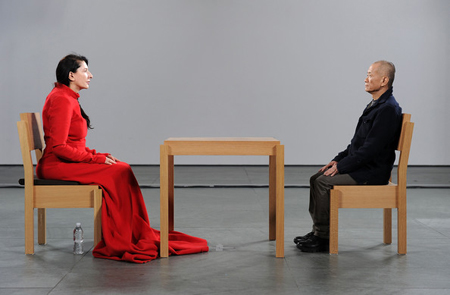 I’m not sure if working with Marina might have freed things up a bit, or whether I’d just agonized enough about Jostle Bastard to move past the block. The collaboration with Marina certainly was interesting almost as an exercise in avoiding satire, I think, which wasn’t something I’d expected. Most of my games have been comedic in one way or another and when I ended up trying to make a digital version of this institute Marina’s in the process of creating, I found a real tension there. There are some really funny things, at a base level, about performance art and some of the exercises that are part of Marina’s method. Sitting in a chair staring into someone’s eyes, lying on a crystal bed, and so on…these can all be profoundly meaningful, or faintly ridiculous, depending on how you’re feeling.
I’m not sure if working with Marina might have freed things up a bit, or whether I’d just agonized enough about Jostle Bastard to move past the block. The collaboration with Marina certainly was interesting almost as an exercise in avoiding satire, I think, which wasn’t something I’d expected. Most of my games have been comedic in one way or another and when I ended up trying to make a digital version of this institute Marina’s in the process of creating, I found a real tension there. There are some really funny things, at a base level, about performance art and some of the exercises that are part of Marina’s method. Sitting in a chair staring into someone’s eyes, lying on a crystal bed, and so on…these can all be profoundly meaningful, or faintly ridiculous, depending on how you’re feeling.
So while making the digital institute game, and some others to do with her exercises, I was constantly fretting about making some that is simultaneously kind of good-natured and amusing, but not funny at the expense of Marina’s work and intentions. It felt like a pretty fine line to walk at the time, though I think I probably pulled it off, mostly through a focus, more or less, on authenticity to the real experiences. It paid off, too, in that the initial wave of people who played the game were serious Marina fans and a lot of them found the games quite moving and important, whereas of course others went through the same experience and said, “this is ridiculous.” That’s kind of perfect though, right?
Anyway, it’s maybe possibly that dancing that non-satirical dance is part of also being more ready to go the other way and do satire too. I should say, for full disclosure of my ignorance, that I know very little of the history or practice of satire itself, and your fancy category words are things I have had to look up. Reading about them, though, I’d say I identify strongly as a Horatian all the way!
———
Pippin,
I listened to nothing but the Hotline Miami soundtrack for most of last winter, which is strange because it is such hot weather driving music. And you are right, it is so close to perfect that it is hard to find other tracks to add to the mix, even from the same artists. Who’d have thought “neon” could be a musical genre?
 I definitely lean toward the This is Ridiculous camp in regards to performance art, but that is probably a symptom of my ignorance more than anything. For instance, I think Marina’s “Artist is Present” is actually very cool and moving but I mentally put it on the same spectrum as karaoke and David Blaine’s idiotic stunts. I suspect this is because I very much do not like being the center of that kind of attention, interesting or silly.
I definitely lean toward the This is Ridiculous camp in regards to performance art, but that is probably a symptom of my ignorance more than anything. For instance, I think Marina’s “Artist is Present” is actually very cool and moving but I mentally put it on the same spectrum as karaoke and David Blaine’s idiotic stunts. I suspect this is because I very much do not like being the center of that kind of attention, interesting or silly.
I suppose, too, that might be one of the reasons I like Jostle Bastard so much. I would never jostle someone like that intentionally. Even the thought of doing so unintentionally gives me anxiety. But we all have seen people act like the Bastard, cutting people off in traffic, shoulder checking old ladies in the super market. That’s sort of the subversive magic of the game – I have to play THAT guy? I hate that guy!
Which is also exactly why I suggested you make some guerrilla videos of jostling innocent Montrealers this summer. I’d have attempted to be more convincing if I was sure you wouldn’t be thrown into some Quebecois gulag.
I have no idea why I know the difference between Horatian and Juvenalian satire off the top of my head (though I did need to look up the spellings). I don’t, as a rule, even enjoy satire. But there you go. Human brains are weird things.
———
Hey Stu,
The performance art thing (to get, perhaps, way, way off topic) is a pretty challenging one. For me, The Digital Marina Abramovic Institute was a terrific illustration of just how much players bring to a game and how important our attitude is when we play something. You had these people who were playing a game in which an avatar literally stands there doing nothing in front of a six-pixel crystal at one point, and they were having what, for them, were important experiences. The game had a feedback room and people left these very genuine and touching messages about how the game was meaningful to them.
Now I’m pretty convinced that I personally wouldn’t have found dMAI moving had I played it fresh, and other people encountered the exact same game and found it irritating or even somehow insulting. So there’s room for this vast range of experiences.
[pullquote]Some people will feel how being a dick has these consequences. Other people will think it’s a piece of crap with crappy graphics that isn’t fun.[/pullquote]
Tying that back to Jostle Bastard, I suppose one thing it makes me think is that so much of the success of the game as satire and as a thoughtful kind of game will rest on the players rather than on anything I can really do at this point. Some people will come into it and kind of feel how being a dick in the game has these consequences and they’ll ask themselves why, and they’ll think about it in relation to Hotline Miami perhaps. And other people will think it’s a piece of crap with crappy graphics that isn’t fun.
My experience with the testers of the game so far has been a kind of pleasing mix of “this game made me have this weird, vaguely harrowing experience” and “this game is totally confused about what it’s trying to do,” perhaps the hallmark of something that was worth making.
I thought about jostling in Montreal as part of a viral ad campaign, but the closest I came to that was playing Snek.
———
Hey Pippin,
I think in every letter so far, I’ve come up with different reason why I like Jostle Bastard, but I like that gradient your testers have presented. And I think you’re right. It’s up to the players to decide the game’s merits now.
Maybe we should shut up and let them play it?
———
Play Jostle Bastard. Then dig into earlier builds in Memory Lane, scope out Pippin’s notebook and learn about the game’s development in Pippin’s Jostle Diaries.
Check out Pippin’s other games on his website and convince him to make AmishQuest on Twitter @PippinBarr. Find Stu Horvath @StuHorvath.
Playable is an ongoing series that examines the development of games by developing games. To learn more about the series and play the previous installments, be sure to check out the official Playable page.

